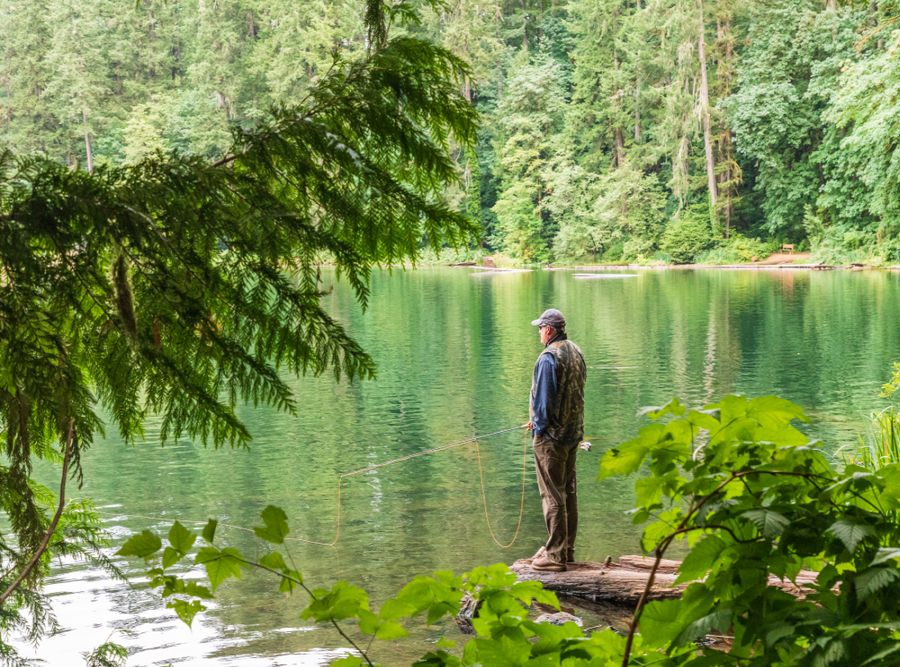If you are a total novice in fishing, you might think that it is as easy as casting your rod and sitting back while you wait for something to bite. Okay, so that pretty much sums up the actual fishing part, but there is so much more that you need to know before you go fishing.
Luckily for you, we have put together this article to walk you through fishing requirements in the US, from fishing licenses (everyone needs to have one of these!) to the rules and regulations regarding the fishing of different types of species.
You might not break any US State fishing records, although who knows what could happen? Keep reading to learn how to enjoy your next fishing trip within the legal requirements.
Licensed to Fish
It doesn’t matter who you are, where you are, or what you are hoping to catch; anyone and everyone planning on fishing or any fishing-related activity must obtain a fishing license. Luckily, these licenses are relatively affordable and easy to acquire.
Licenses are required for everything from fishing to bait catching, as well as spearing, clamming, or trapping fish in any way. If fish are involved at all, you probably need a license.
This is the same whether you are on a boat or land, and it applies to all of the people who are a part of your fishing party. If, for instance, you and a friend are fishing with a seine net and both have hold of a side each, then the both of you must have your fishing license.
There are multiple different licenses available for fishing, so you will need to make sure that you check which one will apply to the type of fishing you are doing. Here are some of the common types of recreational fishing licenses that are available in the United States:
- Freshwater license: You will need this type of license to fish in freshwater lakes, rivers, or streams. It includes any body of fresh water that is landlocked.
- Saltwater fishing license: This is required for the beach, pier, or ocean fishing. You’ll also need a saltwater license to fish in any salt or brackish waterways, which is a mixture of freshwater and saltwater, often found in estuaries or at the point where a river runs into the ocean. Additionally, it is located near beaches, piers, and the ocean.
- Commercial fishing license: This applies to anyone selling their catches, providing fishing charters for hire, or setting traps for crabs. In Florida, you will also need a commercial fishing license if you are not a permanent resident and use a seine net to go bait catching. Check for new regulations every year.
- Non-resident (temporary) fishing license: You will need this license if you are fishing out of town for a short duration of time, available as a short-term license that will often be valid for between one and 30 days, depending on the state you are in.
- Combination license: This license covers you for both salt and freshwater fishing.
- Junior or senior fishing license: Depending on what age you are and whether or not you are under the age of 16 or over the age of 65, you may be able to obtain a fishing license at a reduced cost. This was introduced in some states to encourage taking up fishing as a hobby among the younger generation and the elderly.
- Lifetime fishing license: Like the opposite of a short-term fishing license, some states offer year-long fishing licenses and are a common choice for permanent residents, but this type of license will still need to be renewed annually, which will come with an additional license fee. To eliminate the need to renew your license continually, some states offer a lifetime license which is a more convenient option for residents. However, there is a considerable cost attached, meaning they are expensive to obtain.
- Species permits: You can purchase extra permits or tags that will allow you to fish for specific species, but you must acquire them simultaneously as your license.
- Gear permits: These permits will apply to and are required to use specific pieces of fishing equipment, such as using crab traps or fishing with a seine net.
- Federal permits: These are monitored by a branch of the US government, NOAA Fisheries. They are responsible for managing the Atlantic and Pacific Oceans and Caribbean Sea waters, covering the seas just 3 miles away from the shore up to 200 miles out, and the waters in the Gulf of Mexico from 9 miles out up to 200 miles out from the coast. Most of the time, you will not need a permit to fish in federal waters except in states like New York, where you are required to register yourself if you are planning on fishing in offshore saltwater.
There are usually updates and changes to the license requirements, so be sure to do your research and check at the start of each new year, so you are up to date!
Species Regulations
Due to global warming, excessive fishing, and disease, certain species of fish are more at risk of extinction than others. Many species are now regulated as a result, and the end goal is that this will help prevent the hunting and killing of certain species of fish.
It is essential to read up on what sort of size and harvest limits are in place for different species, as this will help to ensure that you are following the correct regulations at all times. You could also purchase or download a fish ID card, regulations catalog, or a fishing app that you will be able to refer to for the duration of your fishing trip for guidance on the regs.
As a general rule, it is better to avoid removing a fish from water unless you plan to harvest it. Never take a fish out of water purely to take a photo of it, as this is highly distressing for the fish and may stunt or prevent their recovery after they have been caught.
Keep in mind that there are also strict federal regulations regarding the safety of highly migratory species such as tuna, sailfish, marlin, billfish, sharks, and swordfish.
Equipment Regulations
There are state and federal regulations that everyone must follow regarding the equipment they carry with them when fishing. However, these are usually reserved for offshore fishing, where you will be dealing with larger fish that require a high level of care.
The purpose of this is to help you minimize the amount of time the fish is out of the water and reduce its handling to help increase the chances of survival if released.
- Circle hooks: If you are fishing in Atlantic Federal Waters with live bait, you must use non-stainless steel circle hooks and non-offset hooks in some regions.
- Dehooking devices: These help you remove the fish from your hook safely and are an essential requirement in numerous states and federal waters.
- Venting devices: These can be used to help release fish back into the water after being removed from reefs at depths of up to 50 feet or more if they suffer from barotrauma.
Marine Protected Waters
Before we go, it is also essential for us to point out that certain areas are listed as being marine protected. Marine protected sites make up around 26% of US waters, which is almost 1,000 MPA’s, and they can be found in both state and federal waters.
The exact regulations will vary depending on where you are fishing and the type of water you are fishing in. Still, marine protected waters will have strictly enforced laws that are put in place to help preserve and protect natural and cultural resources.
You can find marine protected waters in coastal waters, open oceans, inter-tidal waterways, estuaries, and the Great Lakes. There are different types of categories, including:
- Uniform multiple-use.
- Zones multiple-use.
- Zoned multiple-use with some no-take areas.
- No-take – allows human access, but it does not allow the removal of any natural resource, including fishing.
- No impact – this allows human access, but it does not allow the majority of fishing activities.
- No access – pretty self-explanatory; this means that there is no human access allowed.
So, there you have it. Everything that you need to know about fishing regulations in the US!

























































































I cant see to many people being bothered about any sort of fishing licence after a TEOTWAWKI collapse.
Now what was that about the Corn??
So, were you ever going to actually answer the original questions as to why it is (was) illegal to fish with corn, or what species will supposedly land you in jail with a $25000 fine? Or is this all just for cheap clickbait?
So, were you ever going to actually answer the original questions as to why it is (was) illegal to fish with corn, or what species will supposedly land you in jail with a $25000 fine? Or is this all just for cheap clickbait? Also, how is one to remove the hook from a well hooked fish if we are supposed to leave it thrashing around in the water? That kind of requires securing the fish still and steady in ones hands for safe and efficient removal of the hook, during which time taking a few shots with a camera is totally ok. While it is important to handle the fish gently and carefully and return them to the water as soon as possible, they are more durable than you give them credit for. A moment or two above the waters surface to ensure an effective release is not going to be overly detrimental to the fish.